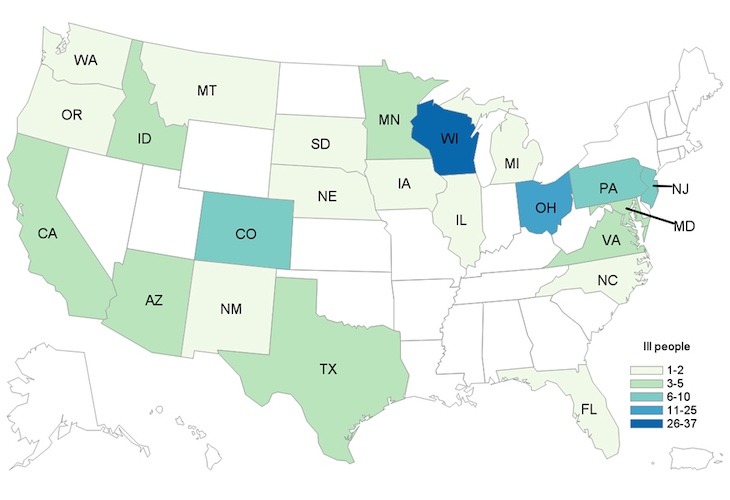The Salinas romaine E. coli HUS outbreak has now sickened at least 102 people in 23 states, according to an update by the Centers for Disease Control and Prevention (CDC). Fifty eight people have been hospitalized because they are so sick, and 10 people have developed hemolytic uremic syndrome (HUS), which is a type of kidney failure. That’s an increase of 35 cases in the week since the last update was issued.

The case count by state is: Arizona (3), California (4), Colorado (6), Florida (1), Idaho (3), Illinois (1), Iowa (1), Maryland (4), Michigan (1), Minnesota (3), Montana (1), Nebraska (1), New Jersey (7), New Mexico (2), North Carolina (1), Ohio (12), Oregon (1), Pennsylvania (8), South Dakota (1), Texas (4), Virginia (4), Washington (2), and Wisconsin (31). Illness onset dates range from September 24, 2019 to November 18, 2019. The patient age range is from less than 1 year to 89.
All evidence, including epidemiological, traceback, and laboratory, indicate that romaine lettuce harvested from the Salinas, California growing region is the likely source of this E. coli O157:H7 outbreak. But, only some of the ill people ate lettuce grown there; no common grower, supplier, distributor, or brand of romaine lettuce has been identified.
There has been one recall issued as a result of the investigation into this outbreak. Missa Bay has recalled almost 100,000 pounds of meat and chicken salads made with romaine lettuce. And in Maryland, people sickened in this outbreak said they ate Ready Pac Caesar Chicken Salads sold at Sam’s Club. The Maryland Department of Health told people to avoid eating that product with the best by date of October 31, 2019. The FDA and CDC have not named those brands as linked to this outbreak.

Minneapolis food safety attorney Fred Pritzker said, “We hope that the government can pinpoint the problem with romaine lettuce and this pathogen, because three E. coli outbreaks in three years is unacceptable. You can contact Fred for help by calling 1-888-377-8900 or 612-338-0202.
This outbreak is caused by the same strain of E. coli O157:H7 that caused outbreaks linked to leafy greens in 2017 and to romaine lettuce in 2018.
Officials are telling consumers to avoid buying or eating all romaine lettuce from the Salinas, California region, including all use-by dates and all brands. That advice applies to all types of romaine sold, including whole heads of romaine, organic romaine, hearts of romaine, romaine in salad wraps, and packages of precut lettuce and salad mixes which contain romaine, including baby romaine, spring mix, and Caesar salad. Hydroponically and greenhouse grown romaine from any region doesn’t appear to be related to this outbreak.
If you have romaine in your home that is labeled “grown in Salinas,” whether alone or with the name of another location, don’t eat it. If it isn’t labeled with a growing region, throw it away. If you don’t know where the lettuce was grown, throw it away.
Symptoms of an E. coli O157:H7 infection include a mild fever, severe and painful abdominal cramps, and diarrhea that is typically bloody and watery. Symptoms of HUS include little urine output, easy bruising, pale skin, and lethargy. Anyone who is suffering from these symptoms should see a doctor as soon as possible, because this infection can be life-threatening. They may be part of this Salinas romaine E. coli O157:H7 HUS outbreak.




